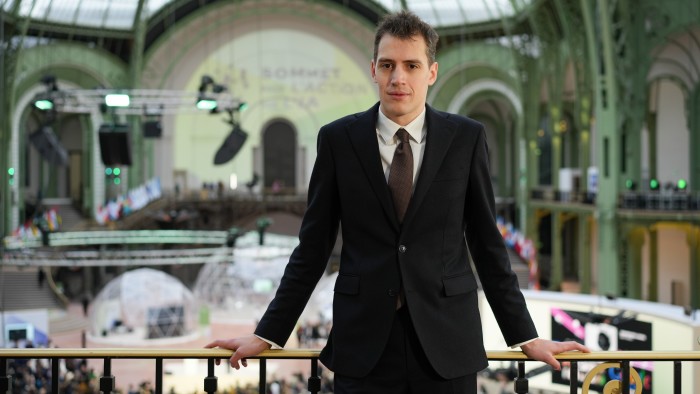Stay informed with free updates
Simply sign up to the European companies myFT Digest — delivered directly to your inbox.
Back in the day, French financial institutions and strategic companies would merrily take equity stakes in one another creating a noyau dur (hard core) of supportive shareholders to deter piratical Anglo-Saxon predators.
The €1.3bn investment this week by Dutch tech company ASML in the French AI start-up Mistral has a similar, slightly retro, feel to it — albeit on a European scale. The deal deepens the relationship between two of Europe’s most impressive tech companies. It will also be cheered by European politicians championing the region’s tech sovereignty. Yet in the global scheme of artificial intelligence, where some investments in the US have been orders of magnitude bigger, the deal may barely register.
Unquestionably, ASML is one of the world’s most extraordinary tech companies. It manufactures highly complex industrial equipment, including its $400mn extreme ultraviolet lithography machines used to make state-of-the-art semiconductors. The Dutch company spent €6bn over 17 years developing the technology, which can print nanoscopic blueprints on to silicon chips, giving it an almost impregnable market position.
ASML has been flying high on the massive investment boom in AI infrastructure. But it has also been caught in the geopolitical crosswinds between the US and China. The strategic rationale for the Dutch hardware company to invest in Mistral is not immediately obvious other than to deepen its AI expertise. “We are not AI experts. We are lithography experts. We wanted to work with a partner that could really help us accelerate AI in ASML,” Christophe Fouquet, ASML’s chief executive, told the FT.
From Mistral’s perspective, the deal has several attractions. ASML is the cornerstone investor in a €1.7bn raise at a punchy €11.7bn post-money valuation. Its participation encouraged existing strategic and venture capital investors — including DST Global, Andreessen Horowitz, Bpifrance, Lightspeed and Nvidia — to participate, too. Mistral might also anticipate better access to the leading AI computer chipmakers given that ASML works with them all.
There have been rumours this summer that Apple might buy Mistral. Some other European AI start-ups have already sold out to US companies, such as Finland’s Silo AI, which the US chipmaker AMD bought last year for $665mn.
But European governments and industrial companies are desperate to preserve a regional AI champion that does not ship data to the US. “The strategy has always been to keep Mistral as an independent company,” Paul Murphy, partner at US venture capital firm Lightspeed who sits on Mistral’s board, tells me.
It is clear that European AI companies cannot mobilise the same volume of money as their US rivals, for whom capital is a strategy.
Last week, Anthropic raised $13bn at a valuation of $183bn. Tech news site The Information reported that OpenAI was projecting it would burn through $115bn of cash by 2029. OpenAI has also been discussing a secondary share sale valuing the company at $500bn. Its chief executive, Sam Altman, has said that the ChatGPT developer might become the “most capital-intensive start-up” in Silicon Valley history.
The local capital available to tech start-ups in Europe is a fraction of that in the US. In his European competitiveness report, published a year ago, Mario Draghi called for an €800bn a year boost to investment to stop the region falling further behind the US and China. In particular, the former Italian prime minister highlighted how little European pension funds allocated to growth capital.
The same is true in the UK. In a speech last week, Anne Glover, chief executive of Amadeus Capital Partners, noted that pension funds in Britain and Ireland invested just 0.007 per cent of their assets in VC, compared with between 0.5 per cent and 2 per cent in North America. Increasing that share to 0.5 per cent would imply a 70-fold increase, transforming Britain’s tech sector.
Mistral, which regards itself as a global company, has not struggled to attract VC investment, especially from the US, and has put it to good use. “Mistral has been exponentially more capital efficient than other labs,” says Murphy.
Its focus on developing open-source AI models and targeting enterprise customers also distinguishes it from most US competitors. To date, Mistral has generated €1.4bn of total contract value, not bad for a two-year-old company. Mistral cannot hope to compete with US rivals when it comes to tapping into the AI investment bubble and splashing the cash. But, now with the support of ASML, it makes sense to play its own game.

